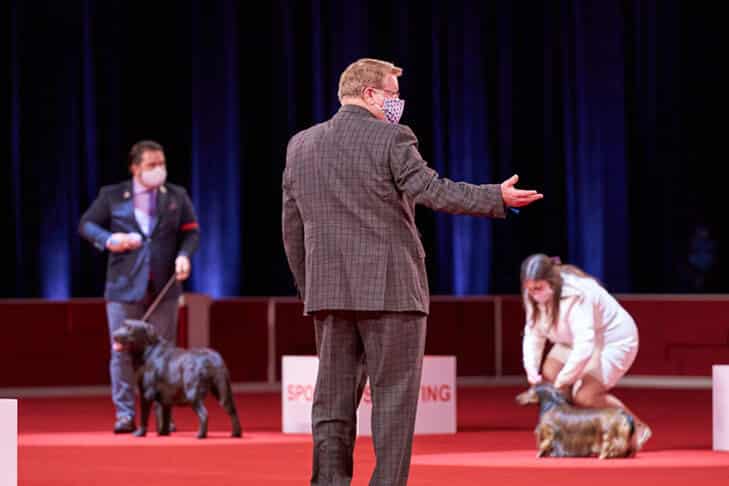
Home » Call to Action Around the Confusion Surrounding NOHS Judges

There are National Owner-Handled Series (NOHS) exhibitors who are unsure about how to think or feel about judges who are not yet approved to judge their Breed or Group. I believe that there are many considerations when bemoaning the judges within those guidelines. Let’s look at the origins of the NOHS, the consequences, and the long game for the owner handler, and the sport of dogs.
Owner handlers make up a majority of exhibitors; the American Kennel Club (AKC) says about 85% of dogs shown are shown by their owners. To celebrate the dedication and enthusiasm of owner handler exhibitors, the AKC created the NOHS. The intent was good; however, there has been confusion, grumbling, and discontent. Why is that?
When the AKC first started the NOHS in 2012, there was confusion among both the judges and the exhibitors as to whether judges were judging the dogs or the handlers. Let’s take a look at why the NOHS Regulations were created. The AKC is very straightforward and states: “Exhibitors wanted more consistency in the execution of NOHS at events and regulations have the benefit of being enforceable.”
At the beginning of this year, the AKC announced the expansion of the NOHS by launching the NOHS Levels of Achievement program. In a press release they stated, “Owners and their dogs can obtain Bronze, Silver, Gold and Platinum recognition by earning a pre-determined number of lifetime NOHS points.”1
**Please note that at Dog Show Mentor, we don’t hyphenate the words “owner handler,” nor do we provide a slash, unless we are using the term, “breeder/owner/handler.” The words “professional handler” are not hyphenated. So it is, in my opinion, equal practice to apply the same syntax. No need to cause a hierarchy or bring attention to difference—either hyphenate both or neither.
I have read numerous Facebook posts that allude to a concern among owner handlers that judges are learning their breeds at the expense of the owner handlers’ NOHS status. Let’s look at this hypothetically. What if, (my fav. phrase), by providing the opportunity to show dogs to these judges, you are helping them view a good quality, well-presented dog that is in good condition? Why is that important for you? It’s important because you are setting the stage for that judge, not only for that moment in time, but potentially for you down the road. Remember, our show careers and our lives are made up of moments in time. Set your stepping-stones; pave the road for your future. Strategically, I encourage you to think ahead—consider the long game. What is down the road? It could be another NOHS win or it could be a regular Group win. It could be a Best in Show on your dog. It depends if you plan to be in the sport for more than five minutes.
If we look at whether having judges who are not approved for every Breed within the Group, or possibly any Breed within the Group, it could be good or bad. Remember that the NOHS judging system that is in place is working for you as an owner handler. Since its inception, the AKC has implemented protocols for the judges. To be able to judge the AKC NOHS Group, a judge (including permit judges) must be approved for at least one Breed in the Group. If a judge is approved for one full Group, they may judge any AKC NOHS Group.
I’m going to be brutally honest about this. I’m a four Group judge who has been judging for twenty years. As such, I judge NOHS Groups and have seen a variety of both rare and not-so-rare breeds. I have been studying many of the breeds that I’m not yet approved for in anticipation of applying for those breeds. Therefore, I consider myself pretty well-informed on the majority of standards. Of course, you wouldn’t have any way of knowing that unless you were my best friend.
So what if the judge is learning? That’s a win-win for you, your breed, the judge, and the sport! And what if you lose your standing in your breed? Make it temporary. It happens all the time in the regular Groups. Regular Group winners are always jockeying for top position in the rankings. Why shouldn’t you as well? They navigate judge changes and levels of knowledge all the time. For example, rankings change continually as a result of judges who are new, or judges who weigh certain characteristics of a standard in a way that doesn’t necessarily benefit a particular dog’s rankings.
My old friend, Art Tingly, shared a story with me about rankings. Those of you in dogs for a while will remember Art. He was a recognized Briard breeder and owner handler who was an honored and revered member of our sport. He told me about a seemingly inconsequential bump in the road on his way to #2 with one
particular dog.
Art was on his way to some shows with his #1 Briard when he had a flat tire. He was able to fix the tire and could have made his ring time, but he was tired and just wanted to get to his hotel. Since there was only one other Briard entered, he decided to skip that show and get to his hotel. You guessed it. At the end of the year, he lost the number one spot by—a mere—one point! Had he only gotten to that show! He would have been #1—Top Dog! And so it goes; if it happened to Art, it could happen to any of us!
When individuals have an exceptional depth and breadth of knowledge, it is to the benefit of the sport to have that knowledge in a judicial position. As an exhibitor, you should be both thrilled and honored that your dog will be evaluated by such an esteemed judge. If you don’t win on that day, you should be on an impassioned quest to figure out why. I value their opinion—I would let most of them buy me a dog—certainly a high compliment!
There is a deep understanding of dogs when you are a dog person who has been steeped in the sport as a career. We say, “a good dog man or a good dog woman.” They know. Most can look at any breed, and if they learn the hallmarks, they can judge the breed. It’s that simple. It’s second sense for them. Or is that sixth sense?
AKC is in the process of making it easier, not harder, for judges to add new Breeds and Groups. The new judging approval system makes it easier to get a Group if the judge is exceptional and/or if they have over four Groups. Let me explain the wisdom behind this recent decision—as I see it. Take note that these are my thoughts and no one at AKC has said this.
What about the Four-Group judges? Well, judges who are allowed to go beyond four Groups are considered by the AKC to be “competent judges.” And just as important to understand is that they have learned how to learn new breeds. They have both honed their process of learning and have the breadth and depth of judging experience that allows them to be able to pick out the best dogs in a lineup.
So, the next time you bemoan a judge who according to their bio appears to have no experience in your Breed or Group, remember these words. It’s a matter of perspective. Consider their knowledge in the sport, how their understanding of dogs will inform their decisions, and on a larger scale, consider how your presence with your dog will impact that judge’s course, your dog’s rankings, and the advancement of the sport of dogs.
AKC https://www.akc.org/sports/conformation/national-owner-handled-series/about-the-akc-nohs/
A Call to Action Around the Confusion Surrounding NOHS Judges: Look at the Long Game
By: Lee Whittier
